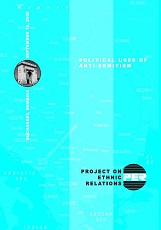Political Uses of Anti-Semitism
Political Uses of Anti-Semitism
Author(s): Konstanty Gebert
Contributor(s): Livia Plaks (Editor)
Subject(s): Inter-Ethnic Relations, Ethnic Minorities Studies
Published by: PER Project on Ethnic Relations
Keywords: Anti-Semitism in Southeastern Europe; Anti-Semitism in post-communist countries;
Summary/Abstract: The endurance of anti-Semitism as a cultural theme in Central and Eastern Europe is particularly striking considering the near-destruction of Jewish populations during the Second World War. While there is a vast literature on anti-Semitism past and present, less has been said concerning anti-Semitism as a deliberately deployed political weapon, and less still about its use in the post-Communist states.
A number of questions can be posed on the political uses of anti-Semitism in the region: Why do anti-Semitic political practices continue to resonate with the public? How did they survive the transitions to post-communist, democratic politics? What enables political actors to employ anti-Semitism as a weapon, and what are their methods? Is there any defense?
To explore these issues and seek practical responses to political anti-Semitism in the region and in Romania, on September 16, 2005, the Project on Ethnic Relations Regional Center for Central, Eastern, and Southeastern Europe organized a roundtable discussion in Bucharest for senior political leaders, intellectuals, and journalists. These participants took on topics ranging from the historical roots of anti-Semitism, to the role of civil society and of the state in combating anti-Semitism, to the controversial issue of Romania's Emergency Decree 31, which outlaws forms of anti-Semitic discourse, including Holocaust denial.
This report documents the discussions at the Bucharest roundtable. Following PER's usual practice, participants are not identified by name in the text. Konstanty Gebert, a journalist at Gazeta Wyborcza in Poland, is the author of this report, which has not been reviewed by other participants, and for which PER takes full responsibility. The text was edited by PER staff.
Series: PER Reports
- Page Count: 30
- Publication Year: 2005
- Language: English
- Content File-PDF

